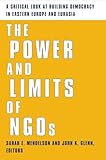The Power and Limits of NGOs : A Critical Look at Building Democracy in Eastern Europe and Eurasia / ed. by John Glenn, Sarah Mendelson.
Material type: TextPublisher: New York, NY : Columbia University Press, [2002]Copyright date: ©2002Description: 1 online resource (300 p.)Content type:
TextPublisher: New York, NY : Columbia University Press, [2002]Copyright date: ©2002Description: 1 online resource (300 p.)Content type: - 9780231124904
- 9780231505833
- Democratization -- Europe, Eastern
- Democratization -- Former Soviet republics
- Europe, Eastern -- Politics and government -- 1989-
- Former Soviet republics -- Politics and government
- Non-governmental organizations -- Europe, Eastern
- Non-governmental organizations -- Former Soviet republics
- POLITICAL SCIENCE / NGOs (Non-Governmental Organizations)
- 320.947
- JN96.A58 P69 2002
- online - DeGruyter
- Issued also in print.
| Item type | Current library | Call number | URL | Status | Notes | Barcode | |
|---|---|---|---|---|---|---|---|
 eBook
eBook
|
Biblioteca "Angelicum" Pont. Univ. S.Tommaso d'Aquino Nuvola online | online - DeGruyter (Browse shelf(Opens below)) | Online access | Not for loan (Accesso limitato) | Accesso per gli utenti autorizzati / Access for authorized users | (dgr)9780231505833 |
Frontmatter -- Contents -- Tables -- Acknowledgments -- Contributors -- 1. Introduction: Transnational Networks and NGOs in Postcommunist Societies -- 2. International Actors and Women's NGOs in Poland and Hungary -- 3. Evaluating Western Assistance to Russian Women's Organizations -- 4. International Assistance and the Development of Independent Mass Media in the Czech and Slovak Republics -- 5. Western and Russian Environmental NGOs: A Greener Russia? -- 6. Environmental NGOs in Kazakhstan: Democratic Goals and Nondemocratic Outcomes -- 7. International Democracy Assistance In Uzbekistan and Kyrgyzstan: Building Civil Society from the Outside? -- 8. International NGOs in Bosnia-Herzegovina: Attempting to Build Civil Society -- 9. Conclusion: The Power and Limits of Transnational Democracy Networks in Postcommunist Societies -- Index
restricted access online access with authorization star
http://purl.org/coar/access_right/c_16ec
Since the end of the Cold War, a virtual army of nongovernmental organizations (NGOs) from the United States, Britain, Germany, and elsewhere in Europe have flocked to Central and Eastern Europe and Eurasia. These NGOs are working on such diverse tasks as helping to establish competitive political parties, elections, and independent media, as well as trying to reduce ethnic conflict.This important book is among the few efforts to assess the impact of these international efforts to build democratic institutions. The case studies presented here provide a portrait of the mechanisms by which ideas commonly associated with democratic states have evolved in formerly communist states, revealing conditions that help as well as hurt the process.
Issued also in print.
Mode of access: Internet via World Wide Web.
In English.
Description based on online resource; title from PDF title page (publisher's Web site, viewed 02. Mrz 2022)


